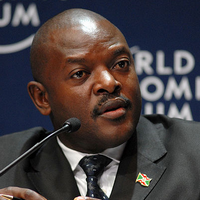BUJUMBURA, Burundi -- For the capital of a country just years removed civil war, this steamy lakeside city is surprisingly cosmopolitan. Though Burundi, according to IMF statistics, has the lowest per capita GDP in the world, no one would guess from Bujumbura's celebrated nightclubs or its colonial era Art Deco buildings. In the hills that rise from the plain of the city center, shantytowns have been razed to make room for McMansion-style houses, reflecting a growing middle class that's also on display at the city's lakeside. There, on a recent Sunday, throngs of urban Burundians, ex-pats and international travelers lounged at French-accented bars along the white sand of Lake Tanganyika -- touted as the finest inland beach in Africa.
But while the beach atmosphere did not show it, this city famed for its joie de vivre is currently on edge.
On Monday, Burundians will go to the polls for the country's first direct presidential election since its decade-long ethnic conflict ended in 2003. Until recently, Monday's vote -- which falls between district elections held in May and parliamentary elections in July -- had been touted as a symbol of both Burundi's hard-earned peace and its promise as a model for African democracy. On May 10, Charles Petrie, an executive representative to U.N. Secretary-General Ban Ki-moon, told the U.N. Security Council, "We believe that successful and peaceful elections in Burundi would raise the bar and set the true standards for remarkable progress in the rest of the broader region."

